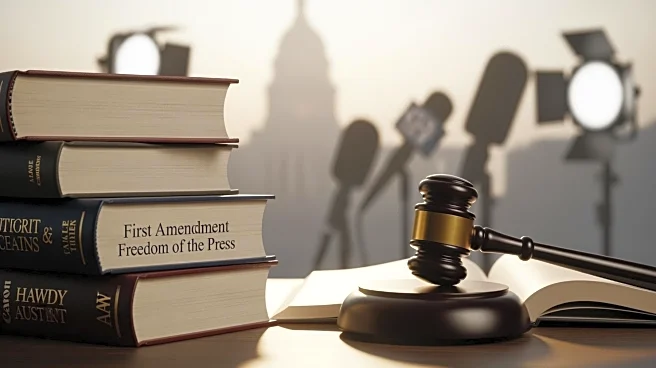What's Happening?
The Pentagon has introduced new restrictions on journalists covering military affairs, which have raised concerns about potential First Amendment violations. These restrictions limit where unescorted media
can go within the Pentagon, including access to public affairs offices of military services. Journalists are now required to sign a document acknowledging a vague new policy that could penalize reporters for asking legitimate questions and impose material harm on news organizations for factual reporting. Several defense trade publications, including Military Times and Defense News, have refused to sign this policy, asserting their commitment to fair and independent coverage of military, defense, and national security topics.
Why It's Important?
The restrictions imposed by the Pentagon could have significant implications for press freedom and transparency in military reporting. By limiting journalists' access and imposing punitive measures for certain inquiries, the policy may hinder the ability of the media to provide accurate and timely information about defense programs and strategies. This could affect public understanding and oversight of military operations and spending. The refusal of major defense publications to comply with the policy underscores the potential conflict between government control and journalistic independence, highlighting the ongoing debate over the balance between national security and freedom of the press.
What's Next?
The defense trade publications that have rejected the Pentagon's new policy are likely to continue their efforts to report on military affairs independently. This could lead to further discussions or legal challenges regarding the policy's compatibility with First Amendment rights. The Pentagon may face pressure to clarify or revise the policy to address concerns raised by journalists and media organizations. Additionally, the situation may prompt broader conversations about the role of the press in covering government and military activities, and the importance of maintaining transparency and accountability.
Beyond the Headlines
The Pentagon's restrictions on media access may reflect broader trends in government efforts to control information flow and manage public perception of military operations. This development could have long-term implications for the relationship between the press and the military, potentially influencing how defense-related news is reported and consumed. The situation also raises ethical questions about the responsibilities of journalists to challenge policies that may infringe on their ability to report freely and accurately.










